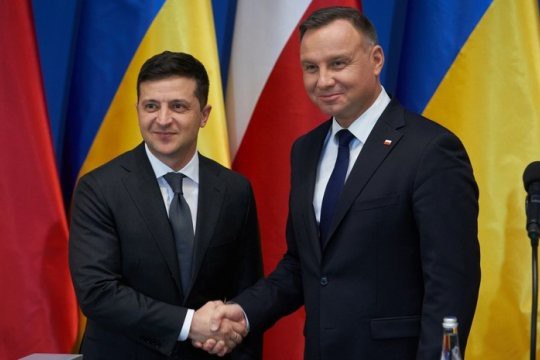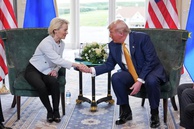President Vladimir Zelensky of Ukraine has said there will soon be no political, economic or historical borders between Ukraine and Poland. This statement, which the Ukrainian leader made as he met with his Polish counterpart Andrzej Duda, has become the subject of speculation across global media.
Shortly before the visit of the Ukrainian leader, the American journal Foreign Policy presented the concept of reviving the Polish-Lithuanian Commonwealth through a unification of Poland and Ukraine. Historically, it should follow the unification of Poland and the Grand Duchy of Lithuania in the 16th century, whereas the reunification of Germany in the 20th century should serve as a practical example. (1).
The idea of a Polish-Ukrainian confederal state hinges on the fact that Ukrainians have been demonstrating a growing tendency towards appreciation of everything Polish in recent months. According to the Kyiv-based Razumkov Center, a startling 94% of Ukrainians declared a positive attitude towards Poland in February-March 2023 (2). Poland is hurrying to fill the political, economic and cultural void which appeared after Ukraine broke ties with Russia. Ukrainian schools are replacing the Russian language with Polish, and are opening Polish language courses for adults.
At the historical discourse level, Warsaw claims that Poland and Ukraine share the legacy of the Commonwealth, which was (as they argue) the prototype of European democracy and religious tolerance. That such statements are far from the truth is beyond doubt - they aim to cultivate in Ukrainians a favorable attitude towards a period of time when Ukraine was under Polish rule and portray the confrontation with Russia from the historical angle as well.
For this reason, while in Warsaw, Zelensky suggested that historians in Ukraine and Poland should get down to “meticulous work”, as “there is no force anywhere in the world which could overcome the Polish-Ukrainian brotherhood”, while Ukrainian army is fighting for the independence of Poland (3).
It is no secret that Poland wants to see Ukraine absolutely pro-Polish and Russo-phobic. Traditionally, the Polish geopolitics have two points of view on the Ukrainian issue: one calls for the annexation of “Eastern Kresy (Borderlands)”, while the other favors the preservation of independent Ukraine and the “Eastern Kresy” as a buffer zone between Poland and Russia.
Polish geopoliticians have long been at odds as to which variant is better. In addition, they have been arguing about what territories should be considered “Eastern Kresy”. Are they only the “traditional” Lviv, Ternopil, Ivano-Frankivsk, Volyn Regions? And the neighboring Rivne, Khmelnytskyi, Vinnytsia and Zhytomyr Regions? Most Poles who live in Ukraine reside in the Zhytomyr Region. Should this be enough to consider the Zhytomyr Region part of the “Eastern Kresy”? There is every pretext to justify Polish expansion.
Polish historical science views the entire territory of Ukraine as Kresy. The Old Polish Guide of the Polish-Lithuanian Commonwealth”, popular on patriotic resources, lists Kyiv, Chernihiv, and Zaporozhian Sich as “Eastern Kresy”(4). Despite the common view, Sich was located not in the present-day Zaporozhian Region of Ukraine, but in Dnipropetrovsk, which are mainly Russian-language regions. That means that complete unification of “Eastern Kresy” with Poland are tantamount to entire Ukraine becoming part of Poland. But this, in the conditions of the Special Operation, is hardly possible.
Which variant will the current Polish leadership will opt for will depend on the current geopolitical layout. If Ukraine remains on the world map as an anti-Russian state formation, then Poland may postpone the decision on Kresy to a later date.
If the Ukrainian state faces collapse and understands at last that it has lost its eastern regions, which were mentally and culturally closer to the Russian World than the Western Ukrainian ones, then Warsaw will have to address the problem of the strategic depth of the “frontier” between Poland and Russia, as the territory of the Ukrainian buffer is bound to degrade. Under the circumstances, it is quite likely that Poland may pass a decision to deploy troops in Western Ukraine under a reasonable pretext. The area of the deployment of Polish forces will thus become a border between the Russian World and the West.
This has happened before, the last such case took place under Petliura a little more than one hundred years ago. The algorithm of Polish eastern policy has not changed since then. On the contrary, the geopolitical doctrines of those days are considered prerequisites for the future. When Warsaw declared a turn westward in 1989, it based its eastern policy on the political format of 1918-1930s.
Poland is therefore content with both variants. Should further developments make it possible to maintain the ill-fated strategic depth, that is, if the Ukrainian buffer does not narrow in size to a critical point, Warsaw might find the existence of such Ukraine suitable.
But if Ukraine begins to disappear from global maps, then Poland will have a chance to take the “Eastern Kresy”. The Polish president who will fulfill the “Anschluss” will become a “hero” and his party will enjoy high ratings. The ruling elites in Poland are fully aware of that.
As for the future of Ukraine proper, it is becoming ever more evident that few are concerned about it, despite the dramatic statements of the collective West. In the meantime, Warsaw understands that it has a historical chance to become the driver of western policy in this direction. Whatever the case, Ukraine is all but an instrument in the hands of its present-day curators who are set on addressing their own geopolitical goals.
The opinion of the author may not coincide with the position of the Editorialи
- https://foreignpolicy.com/2023/03/26/its-time-to-bring-back-the-polish-lithuanian-union/?tpcc=onboarding_trending
- https://kresy24.pl/tak-ukraincy-oceniaja-polske-zaskoczenie/
- https://kresy.pl/wydarzenia/zelenski-w-warszawie-ukrainscy-zolnierze-chronia-niepodleglosc-polski/
- https://wid.org.pl/bedeker-czyli-rzeczpospolitej-opisanie/
read more in our Telegram-channel https://t.me/The_International_Affairs

 12:40 19.04.2023 •
12:40 19.04.2023 •



























